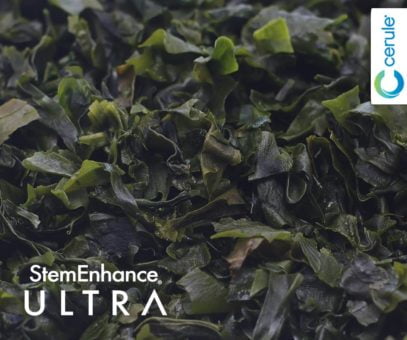Fucoidan Supports the release of Adult Stem Cells
 Undaria Pinnatifida (fucoidan) is well known to support the immune system and has been documented to support a long-lasting increase in the numbers of circulating adult stem cells. It also supports the homing of Adult Stem Cells.
Undaria Pinnatifida (fucoidan) is well known to support the immune system and has been documented to support a long-lasting increase in the numbers of circulating adult stem cells. It also supports the homing of Adult Stem Cells.
Fucoidan is a marine alga from pristine ocean environments around the world. It has biological activity in many applications, including cardiovascular health; inflammation; antiviral and inhibiting an enzyme important in the development of dementia. It also assists in improving memory.

Researched Health Benefits of Undaria Pinnatifida Seaweed
Published research indicates that fucoidan compounds have the portential to:
-
Modulate Immune Response
- Stimulate key markers of both innate and specific immunity
- Activate dendritic cells, natural killer cells and T cells
- Exert potent anti-pathogenic and anti-viral effects
- Dampen allergic responses
-
Affect Cancer
- Exert anti-cancer activities, cell-cycle arrest and apoptosis and modulate angiogenesis
- Possess anti-tumorigenic properties
- Be used as an adjunct therapy alongside conventional oncology treatments
- Enhance the activity of chemotherapy agents
- Fucoidan caused DNA damage in HCT116 cells (Human colon cancer cells), but not in normal cells,
-
Address Inflammation
- Address both local and systemic inflammation
- Exert anti-inflammatory activity in topical, oral and intravenous delivery systems
- Inhibit selectins and adhesion of leukocytes
- Inhibit pro-inflammatory COX and LOX enzymes
- a dietary intervention for inflammation in the gut and for the prevention of colon cancer [Marinova]
-
Support Cardiovascular health
- Stimulate repair mechanisms on the lining of blood vessel cells
- Exert anti-inflammatory effects
- Reduce cholesterol uptake
- Improve cholesterol and triglyceride balance in the blood
-
Promote Stem Cell activity
- Increase the release of stem cells into the blood
- Increase amount of sticky receptors (CXCR4)
- Promote an increase in the number of immune cells when fighting infection
-
Assist Digestive Health
- High levels of beneficial Omega 3 Fatty acids
- Fucoxanthin, a compound in Fucoidan, promotes the burning of fatty tissues
- Promote anti-pathogenic activity in the digestive tract
- Exert anti-inflammatory and soothing effects on the gut wall
- Protect against liver disease and fibrotic damage
- Reduce symptoms of ulcerative colitis, gut dysbiosis and inflammation
-
Inhibit Viral action
- Inhibit a range of viruses, including clinical strains of influenza and herpes
- Inhibit the adhesion of viruses to host cells
- Prevent or limit viral infections
- Ease symptoms of patients with chronic viral infections
-
Benefit skin and reduce visible signs of aging
- protects nerve cells against damages
- Inhibit matrix degrading enzymes
- increase responsiveness of key anti-ageing enzymes
- Reduce inflammation and activate restorative genes following UV damage
-
other considerations
- Japanese regularly consume it as Wakame salad
- contains high levels of sodium, calcium, iodine, thiamine and niacin.
- in Traditonal Cchinese Medicine it is used to boost fertility and promote menstrual regularity
- in Korea it is given to new mothers after birth to support breast-feeding
Fucoidan induces the self-destruction of the cancer cells, boosts immunity and prevents the tumour from growing new blood vessels, which cuts off the nutrient supply to the cancerous growth. In other words, fucoidan does not attack cancer cells directly, but causes them to “surrender”.
Fucoidan does not promote programmed cell death in normal cells – only on cancer cells. therefore, fucoidan produces no side effects, unlike anti-cancer drugs, so the patient suffers no additional damage or discomfort. This anti-tumour property of fucoidan is observed and reported by the Biomedical Research Laboratories of Takara Shuzo and the Research Institute for Glycotechnology Advancement.